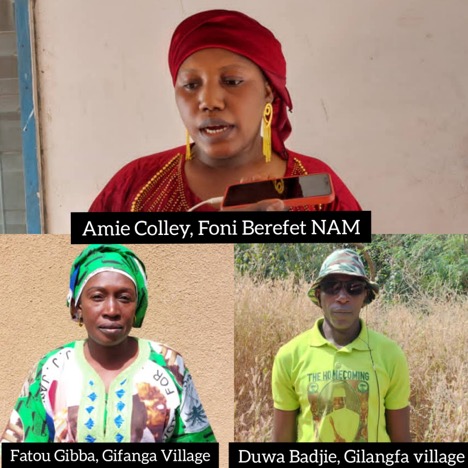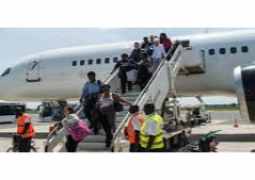
Foni is bordered with Casamance where MFDC separatists hide to carry out their activities. This has become a nightmare for thousands of Foni inhabitants, resulting in many leaving the border villages for safety. Since Barrow’s government takes power in 2017, the ECOWAS military intervention in The Gambia (ECOMIG); Senegalese soldiers occupied some settlements in Foni in 2017 and was described by the government as “security reasons”. The occupation of the ECOMIG Senegalese army in Foni has allegedly caused several ‘fatalities’ which resulted in an intensified call for the removal of those soldiers by the five Foni Parliamentarians.
According to a data obtained from the National Disaster Management Agency (NDMA), since the crisis emanated from the Casamance-Foni border in 2022, 4042 children between the ages of 0 and 5 have been affected, 703 people were internally displaced, and two migrants have been registered.
Currently, residents of Foni borders are gripped with anxiety to visit their forest/bushes to carry out their activities due to fear of being shot by either the MFDC or the Senegalese soldiers posted within the borderline.
On 17 May 2022, young Foni men were allegedly shot by a flying military drone believed to be operated by the Senegalese soldiers stationed at Casamance borderline. Gambians allegedly shot at include Lamin Badjie alias Lang Badjie of Kusamai village and another six people from Foni Jiking in the Foni Bintang District. However, the government has still not released any statement on this particular incident and this led to the question of many Foni residents; if the government cares about their lives.
During January 2022 clash between ECOMIG Senegalese soldiers stationed in Foni and the MFDC’s separatist, the Senegalese troops were camped at Gilangfa village in the Foni Binta Karanai District to respond.
Our medium has reached Duwa Badjie, the only man who witnessed the clash that resulted in the capture of some Senegalese soldiers by the Separatists.
Mr Badjie narrated that everyone in the village then left the territory empty due to fear. He said: “The bullet shells used to drop in my compound during the firing. There was a day I was nearly shot at after a bullet passed through my backyard.”
On the incidents of alleged military drones, he told our reporter that they could no longer visit their farms to collect their seasonal harvest or fetch firewood. He explained that “boys in Gifanga and Kusamai who were fetching firewood and searching for their cattle were recently shot at by the Senegalese military drone. Three people were shot and one died,” Duwa said.
The residents of the Foni felt remain unsafe under President Barrow’s government despite the Chief of Defence Staff’s visit to discuss peace with them.
Mr Badjie claimed that the CDS was speaking on issues of wars in Liberia and Sierra Leone, which they were not interested in, adding that dealing with their current situation, was more important to them.
Fatou Gibba, also a resident of Gifanga and a niece to Yankuba Badjie, a young man allegedly killed by the Senegalese military drone, said Yankuba was “unlawfully killed”.
“We are so disappointed and this doesn’t encourage national unity because our people are killed by foreign soldiers. Women and children in the communities suffer more and we are helpless compared to other citizens,” he said.
Amie Colley, the National Assembly Member (NAM) for Foni Berefet, in an interview with this medium, also reiterated that since the deployment of ECOMIG (Senegalese soldiers) at Bwiam in 2015, their women began to develop fear and couldn’t continue using their gardens.
“They fear when they see soldiers heavily armed,” she said, adding that the government should understand that the people of Foni don’t hate President Barrow and should be seen as citizens.
“They shouldn’t see our people as rebels. They shouldn’t have the mindset that we hate President Barrow. The soldiers have raped our children, played with people’s wives, killed our goats and shot at vehicles. The only solution is to remove them in Foni,” NAM Colley said.
In an interview with the Public Relations Officer (PRO) of the ECOMIG Forces to shed light on the above allegations, Lt. Col. Alfred Marteye denied the allegations. He said: “The allegation is false. Our troops are very professional and disciplined. Engage local police in Foni to get the truth of the matter.”
The most vulnerable people who suffer from the crisis are the children, who couldn’t at some time access their schools due to fear. Our medium engaged the National Coordinator of Child Protect Alliance (CPA), Mr Lamin Fatty, who stated that the government is being complacent around the issues of children within the Foni borders.
“This is about inter-state and the government should be able to engage Senegal to make sure they do not allow flying drones beyond their borders. That’s why every country has its sovereignty and it’s compromised by the state,” Fatty said, adding that children are not only denied to go to school but are also exposed to trauma – a situation he said the government is not responding to in providing them with psychosocial support.
On 3 June 2017, residents of Foni Kansala gathered in Kanilai to show their dissatisfaction with the presence of the ECOMIG Senegalese troops in Foni, which resulted in an alleged live bullet firing, killing Haruna Jatta while eight others allegedly sustained bullet injuries.
Responding to the matter, the then minister of Interior, Mai Ahmed Fatty, said in a televised statement on The Gambia Radio and Television Services (GRTS) referring to the demonstrators that "they either obey the law or be consumed by the law".
On 10 December 2022, three men who obtained both Gambian Identity Cards and Refugee Cards, namely Demba Colley, Alagie Colley and Ebrima Colley were allegedly shot dead by the Senegalese military drone within the Casamance-Foni borderline while Alagie Manga, a Gambian, sustained injuries.
However, the chief of Foni Kansala, Ali Nyassi, debunked the incident happening in The Gambia, but in a Casamance village called Kajaloko. Chief Nyassi said: “It's important for people to be mindful of the information they feed the public to avoid creating tension.”
Our medium engaged Mr Sheriff ML Gomez, a security expert who served in The Gambia National Army (GNA) as a career Military Officer and studied at Pakistan Military Academy, Fort Benning and Fort Knox in the United States.
Gomez, who holds MSc in Business Administration and BA degree in Humanities, was one time the minister of Youth and Sports and also Interior.
Dwelling on the country’s security status, the current consultant specialising in Security and Youth, told this medium that the Fonis and its attendant border security issues/challenges have been perennially playing out because of many factors germane to the region.
The expert continued that in this particular instance in the Fonis, “it is indeed evident that the Casamance issue and conflict dimension has presented the greatest humanitarian and social-movement of people, as well as security and political challenge in this area”, adding that the people are wedged between the Casamance rebels and the armed forces of Senegal. On this security and social front, he advised that The Gambia has to make a delicate political, diplomatic and security balance taking into account its people, the level of homogeneity between the Casamance and Fonis and the government of Senegal.
The ECOMOG and UNMEE veteran explained that evidently what is not helping this situation is the deployment of the ECOMIG forces whose contingent includes Senegalese troops, deployed at the Fonis, bringing the fighting parties in close proximity to each other, with the people (Casamance and Fonis sharing strong ethnic affinity and sentiments) right in the mix.
“This particular deployment in Foni particularly complicates the situation further because of the perennial nature of the conflict between Senegal and its Casamance region and The Gambia being a wedge between Senegal North and South,” he said.
Having laid this scenario, he stated that what may be safe to say is that “something had happened, given that there is at least one person that has been shown/reported (at best) on social media, alleged to have been shot dead. The fundamental questions therefore should be: what side of the border the incident is said to have happened? Are there witnesses? Would a drone strike not be easily visible and verifiable? I will equally add also that even if it is a gunshot and not a drone the autopsy should be able to determine the cause of death (the impact should be different) and or provide the bullet for which where it comes from shouldn’t be very difficult to trace in this day and age.”
The expert further advised the government to recognise that it has the burden of responsibility to the Gambian people to reassure and provide security to them, needing, in circumstances like these, to immediately come forward and provide timely information and launch its investigation into the matter for a full report on what is the situation, and what it will do about this incident, and what guarantees will be put in place on people’s safety and security moving forward.
Several efforts were made to seek the views of the Minister of Defence or his permanent secretary to dwell on the matter but were all futile. Efforts were also made to engage the Office of the National Security under the Office of the President but all ended up in futility. However, in a press release issued on December 11, 2022, the government promised to conduct an investigation to ascertain the circumstances leading to the deaths.



